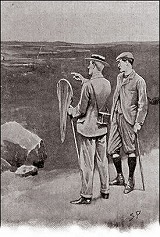“I have only been here two years. The residents would call me a newcomer. We came shortly after Sir Charles settled. But my tastes led me to explore every part of the country round, and I should think that there are few men who know it better than I do.”
“Is it hard to know?”
“Very hard. You see, for example, this great plain to the north here with the queer hills breaking out of it. Do you observe anything remarkable about that?”
“It would be a rare place for a gallop.”
“You would naturally think so and the thought has cost several their lives before now. You notice those bright green spots scattered thickly over it?”
“Yes, they seem more fertile than the rest.”
Stapleton laughed.

“That is the great Grimpen Mire,” said he. “A false step yonder means death to man or beast. Only yesterday I saw one of the moor ponies wander into it. He never came out. I saw his head for quite a long time craning out of the bog-hole, but it sucked him down at last. Even in dry seasons it is a danger to cross it, but after these autumn rains it is an awful place. And yet I can find my way to the very heart of it and return alive. By George, there is another of those miserable ponies!”
Something brown was rolling and tossing among the green sedges. Then a long, agonized, writhing neck shot upward and a dreadful cry echoed over the moor. It turned me cold with horror, but my companion’s nerves seemed to be stronger than mine.
“It’s gone!” said he. “The mire has him. Two in two days, and many more, perhaps, for they get in the way of going there in the dry weather and never know the difference until the mire has them in its clutches. It’s a bad place, the great Grimpen Mire.”
“And you say you can penetrate it?”
“Yes, there are one or two paths which a very active man can take. I have found them out.”
“But why should you wish to go into so horrible a place?”
“Well, you see the hills beyond? They are really islands cut off on all sides by the impassable mire, which has crawled round them in the course of years. That is where the rare plants and the butterflies are, if you have the wit to reach them.”
“I shall try my luck some day.”
He looked at me with a surprised face.
“For God’s sake put such an idea out of your mind,” said he. “Your blood would be upon my head. I assure you that there would not be the least chance of your coming back alive. It is only by remembering certain complex landmarks that I am able to do it.”
“Halloa!” I cried. “What is that?”
A long, low moan, indescribably sad, swept over the moor. It filled the whole air, and yet it was impossible to say whence it came. From a dull murmur it swelled into a deep roar, and then sank back into a melancholy, throbbing murmur once again. Stapleton looked at me with a curious expression in his face.
“Queer place, the moor!” said he.
“But what is it?”
“The peasants say it is the Hound of the Baskervilles calling for its prey. I’ve heard it once or twice before, but never quite so loud.”
I looked round, with a chill of fear in my heart, at the huge swelling plain, mottled with the green patches of rushes. Nothing stirred over the vast expanse save a pair of ravens, which croaked loudly from a tor behind us.
“You are an educated man. You don’t believe such nonsense as that?” said I. “What do you think is the cause of so strange a sound?”
“Bogs make queer noises sometimes. It’s the mud settling, or the water rising, or something.”
“No, no, that was a living voice.”
“Well, perhaps it was. Did you ever hear a bittern booming?”
“No, I never did.”